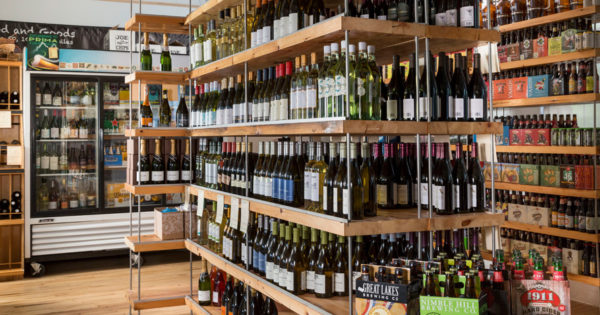
Walmart recently patted itself on the back for reaching what it called a “grocery pickup milestone,” with 2,000 stores in 29 states now including alcohol as part of their online grocery offerings.
The retailer can also include alcohol in deliveries from nearly 200 stores in California and Florida “with more being added in accordance with local and state regulations.”
Online grocery is already a wildly competitive and experimental space with retailers keen to attract consumers and cement their loyalty as the sector grows. But when you factor in booze—and the state and local laws that regulate it—we get another reminder why no one has come up with a blanket solution that works across all 50 states.
Why booze is problematic for retailers
According to Megan MacDonald, senior marketplace channel analyst at digital marketing agency Tinuiti, expanding into booze is costly for retailers, as many states mandate that alcohol can only be sold by liquor stores and bottle shops—and/or businesses require separate licenses to sell beer/wine and liquor.
“This is why only 2,000 of Walmart’s 4,700 brick-and-mortar locations currently offer booze through online grocery pickup,” MacDonald said. “Due to the nuances of these liquor laws throughout the U.S., smaller ecommerce startups such as Drizly have been created, which leverage current liquor stores who own licenses and put the burden of hiring delivery drivers directly onto the liquor stores.”
Coincidentally, Food and Wine reported Amazon is planning to open a 200-square-foot liquor store in San Francisco so that it can obtain a liquor license and expand its ability to sell beer, wine and spirits beyond Whole Foods in the area. Amazon also offers booze through its two-hour Prime Now service in some areas.
As of press time, the ecommerce giant had not responded to Adweek’s request for comment on its San Francisco liquor store or any further plans to sell alcohol online.
Nonetheless, it’s a pretty safe bet alcohol will play a key role in online grocery as it evolves. For starters, consumers are already using alcohol delivery services like Drizly, Instacart, Minibar, Postmates and Saucey.
“Since Amazon is already such an important part of the consumer lifestyle, it makes sense to integrate spirits into its already vast product offering,” added Henry Morita, CEO of tequila brand Pure Azul Beverage Company.
Bread, butter and booze
Booze is already an important part of grocery retail.
Anne Ryan, vice president and director of strategy at marketing communications agency Brownstein Group, pointed out how important alcohol sales are for grocery retailers through their new store concepts that include bars, tasting rooms and taprooms, such as Giant Food Stores’ Heirloom Market, which will open another location later this month in Philadelphia with an underground taproom with more than 40 craft beers, wines, hard seltzer and even hard kombucha on tap.
So it stands to reason that alcohol and grocery will only become more intertwined as retailers seek to consolidate customers’ shopping trips.
“When it comes to shoppers’ expectations for speed and convenience, alcohol is not any different from other categories, so the migration of alcohol sales to the online channel is expected and unavoidable,” added Diana Medina, director of ecommerce solutions at tech services company Inmar. “However, according to Inmar’s 2018 ecommerce study, only 10% of surveyed shoppers report buying alcohol online.”
That being said, Ryan, who is working with both craft brewery Yards Brewery and Giant Food Stores’ online grocery delivery platform, noted her agency’s research in Philadelphia has shown craft beer fans average three beer runs per week, which is “a lot of errands that could be consolidated through online delivery.”
“Just as booze is key to bringing customers to brick-and-mortar grocery outlets today, it is key to getting more people to use online services and platforms, too,” she added.
https://www.adweek.com/digital/how-booze-upping-ante-online-grocery-shopping/

